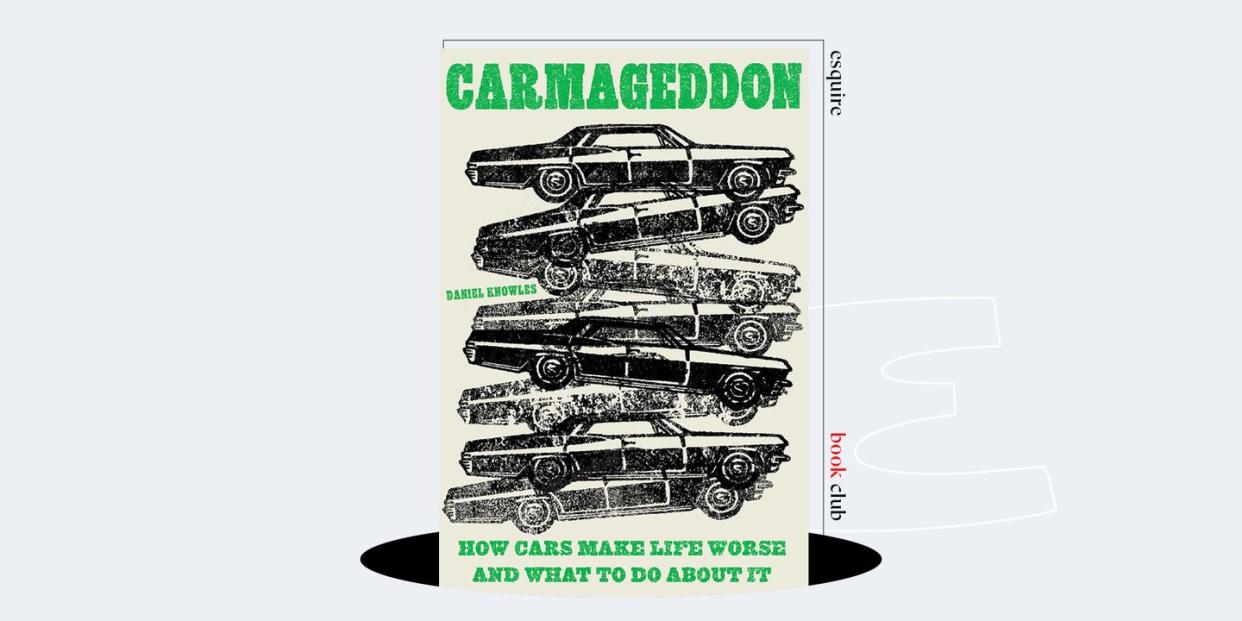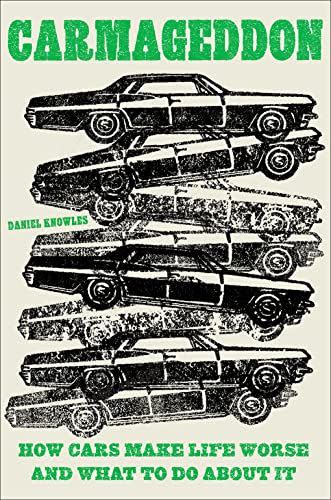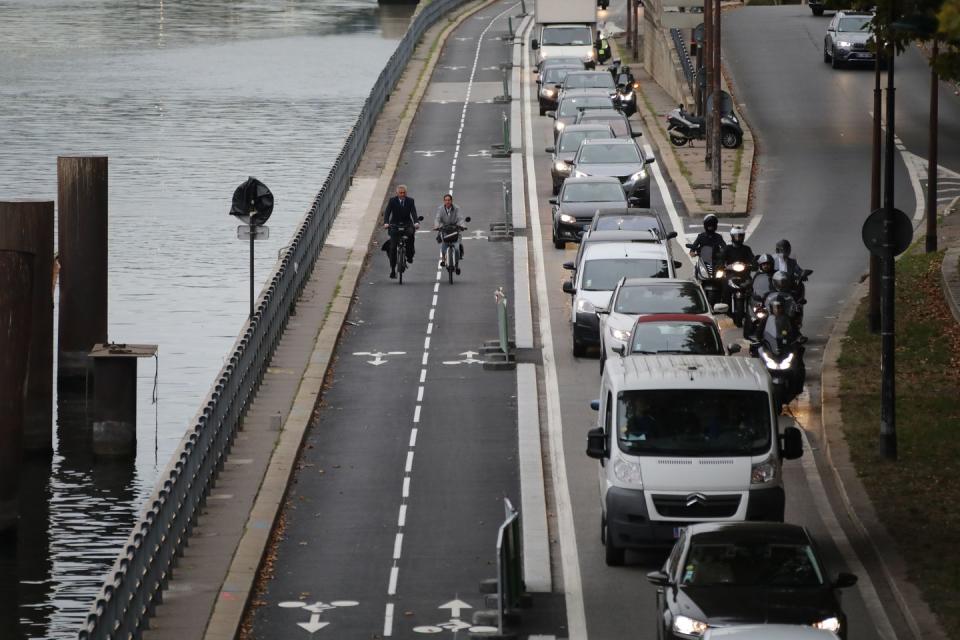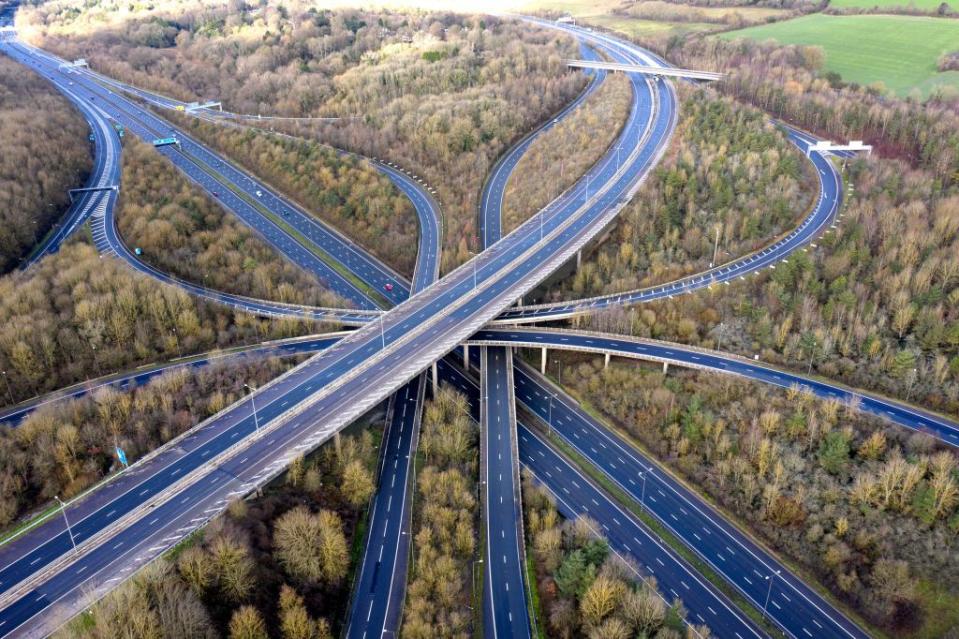An Oddly Compelling Case to Ditch Your Car

"Hearst Magazines and Yahoo may earn commission or revenue on some items through these links."

“America is the land of opportunity,” they say. Supposedly it’s the land of the free, the land of milk and honey, the land of second chances… but mostly, it’s the land of free parking.
America as we know it has been shaped in the automobile’s image. From sea to shining sea, giant parking lots engulf one third of the land in American cities, while our dependence on cars leaves us unhappy, unhealthy, and unequal. At least, that’s the case presented by Daniel Knowles, the author of a spirited new polemic hitting shelves this week: Carmageddon: How Cars Make Life Worse and What to Do About It. “Cars are not just about how you get around,” Knowles writes. “They are about what the city you live in looks like and what your daily life looks like. The car goes to the core of almost everything, dominating almost all public spaces to the detriment of pedestrians and cyclists.”
But it doesn’t have to be this way. It was only just a century ago, when automobiles first took to the streets, that concerned citizens protested against ceding their public space to what seemed like disruptive deathtraps. Now, similar arguments have made a resurgence, as cities and suburbs reimagine how to make more space for people, and less space for cars. A century from now, could we be living much less car-dependent lives? Knowles sure thinks so—in fact, citing cities like Amsterdam, Tokyo, and New York, he points out that the change is already underway. “People have an aversion to change, but change can be very popular when it happens,” Knowles tells Esquire.
Knowles Zoomed with Esquire from his home in Chicago, where he lives without owning a car. As we spoke, the elevated train rattled past his home office window. This conversation has been edited for length and clarity.
ESQUIRE: Where did this book begin for you?
DANIEL KNOWLES: I began work on the book at the very beginning of lockdown in London, in March 2020. As a foreign correspondent, I couldn't travel anywhere, so I suddenly had a lot of free time. I got on my bicycle, only to discover that the roads were clear and lovely. Generally everything about the pandemic was terrible, but suddenly, you could get around London on a bicycle or on foot. It was so quiet. All the traffic just disappeared. But I really started planning the book when I was living in Nairobi, Kenya. There, most people can't afford a car, so they walk, cycle, or take public transit to work. They endure this awful city layout and all this pollution that benefits the 5% to 10% of the population who have cars. Even the car owners are miserable because they deal with traffic jams all the time, so it doesn't really work for anybody. Living there, I began thinking about how American car culture is spreading all around the world. I really wanted to communicate that message. There’s been plenty written about how car-centric America is, but I want to stress that this is a global problem.
You write about this very American idea that cars equal freedom. Where does that mythos come from, and what’s inaccurate or misleading about it?

$28.00
amazon.com
If you look at the early days of the car, when Americans were beginning to buy cars in large numbers, they were mostly used for excursions. That comes out of a tradition that began with the bicycle industry. In the late Victorian period, cities were very polluted, and people used bicycles to get to the countryside in search of clean air. Cars followed on that idea of the ability to go out and be anywhere. Suddenly you could get out into undeveloped, untouched territory at a time when there was a romantic backlash against industrialism and all the damage it wrought. That’s the origin story of cars as freedom: it was that idea of escaping cities. But what I want to get across is that there’s a huge coordination problem here. If you’re the one guy with a car, you can go anywhere. It is freedom. But it stops being freedom when everybody has a car, because suddenly it no longer works. You’re in a traffic jam with everybody else, everything is further apart, and it stops being freedom.
As you point out in the book, what about the freedom of people who walk, bike, or take public transit?
Exactly. The more and more people bought cars, the more we had to rebuild everything to make it possible for people to drive. That took away the freedom of everybody else. Throughout the 1920s, there were protests against cars, because people saw their streets being taken away from them. Children used to play in the streets—people were able to walk, do business, and live. Then streets suddenly became scary places. Now every child is raised with that fear. The whole street was for everyone, but that’s been taken from us.
It’s amazing to think that just a century ago, people were protesting against cars. It gives me hope that perhaps in another century, we could reshape our car culture.
It’s already happening. One of the reporting trips I took for this book was to Paris. My earliest memory of Paris is of going there with my parents in about 1999. I remember being stuck in a traffic jam for hours; my mom and sister eventually got out and went to the hotel on foot. Now Paris has pedestrianized many of its streets and there are bicycles everywhere. This is true of London too, and it’s beginning to happen in the United States. Change will snowball, because once more people get out of their cars, there's more support for further changes. There are very few places that have removed a road and gone, Oh God, that was a mistake, let's put it back in again. Cities like San Francisco and Boston have removed parts of their highways. I just saw a study showing that the increase in the number of jobs and businesses in those neighborhoods is astronomical. But the thing is, some cities will change, and others will keep sprawling. Rebuilding Houston into a walkable city would be the work of a century.

What does this mean for rural communities? It's hard to imagine the Great Plains becoming bikable.
It’s always going to be tougher to make the case for getting rid of your cars in rural communities. But truly rural communities make up less than a fifth of the population; most Americans live in cities or suburbs. Just because you need a car doesn’t mean you should have to use it for everything. There are rural villages across Europe that are quite walkable—you get out of your car and walk between a few different places, rather than every single shop having its own giant parking lot. The urgency isn’t in rural places; it’s in getting rid of cars in cities and suburbs. Perhaps you can't get rid of them, but you can make it so that families don't need two cars. The real low-hanging fruit in this country is making it possible for people to get by with just one car. That will save American families a huge amount of money.
In the book, you point out that cars are attached to a certain kind of masculinity. You quote William Faulkner calling the car “our national sex symbol.” How did cars become so tangled up with masculinity? If we move toward a less car-centric way of life, what would it mean for so-called “car guys”?
The vast majority of people buying cars just want something that gets them from Point A to Point B; they want to spend as little as possible to own the most reliable car. That results in a car industry that's extremely competitive, with quite low margins. Most car manufacturers don't make that much money on, say, a Toyota Camry. The people they can really profit from are the people who are really into cars. Those people are willing to spend an extra $10,000 or $20,000 because the car drives or looks a certain way. Car marketing targets those people entirely, because they're the most profitable subset of drivers. That’s set up a pattern where the car industry promotes the idea that cars are something masculine and powerful that makes you a more rugged man. That then gets transmitted through films and culture.
But I actually think something is changing. The linking of people's cars and identities is less strong with members of our generation than with previous generations. Having an expensive car is no longer the dating signal of, “I'm a successful man.” Now, the dating signal is, ”I can afford to live in a nice neighborhood where we can walk or cycle.” The car-centric version of masculinity feels very middle-aged, these days.
I wonder if this has something to do with the disappearance of cars as a viable hobby. Back in the day, guys would tinker with their cars, but with today’s cars, that’s not really possible.
That's completely true. Modern cars do not have that promise of tinkering in the garage and understanding the machine anymore. For people who are into that kind of thing, now they’re tinkering with their bikes. Guys with $7,000 bikes has become a big thing. I've got a friend who lives in New Mexico who’s a car guy, but he only buys old cars for precisely that reason. He feels that new cars are over-engineered; he can’t repair them or do anything to them.
In the book, you quote Pete Buttigieg saying that we need to think about bikes, wheelchairs, and scooters as much as we do planes, trains, and automobiles. If you could have his job for a day, what would you do as the Secretary of Transportation?
I can think of a few meaningful reforms. The first would be the government instituting a vehicle mileage tax, because the federal gas tax hasn't been raised in decades and it no longer covers even the maintenance of roads and bridges. It means that this ginormous subsidy is only going to get worse, because as people are switching to electric cars, they’ll pay even fewer gas taxes, which means more damage to the roads. It’s a problem for the federal government, but an even bigger problem for local governments, which will struggle to maintain infrastructure. Some poorer suburbs are spending a huge proportion of their income on basic maintenance. As the transition to electric cars happens, finding a way to raise some revenue is an urgent problem.
I’d also like to see the government mitigate some of the harms that cars do by at least trying to get people into more efficient cars. In recent decades, America has really diverged from other countries in the efficiency of gas-powered cars. That kind of push could reduce climate change effects. Also, the federal government needs to invest its highway funding better. If you're getting a federal grant to build or repair a highway, it should include a provision that you put in a bus lane or a bike lane. Only now, after decades of building incredibly unsafe roads, are we beginning to think more about safety in the design of our roads. If I were Pete Buttigieg, I would be trying to set standards from traffic engineers on federally funded projects. Building these roads, we should have to think: is this road safe? Rather than, how can we get the most vehicles through this road at the fastest rate? That’s been the model for half a century, but this subtle change could make a big difference. And obviously, if I was king for a day, I would raise the gas tax to $15 a gallon… but then, I would be executed.

One of the biggest challenges to ending our dependency on cars is undoing this sense of entitlement among car owners. How do we reckon with people who feel like their rights are being infringed upon if they can't park for free, or if suddenly things are just a little bit harder or more expensive?
This is the big challenge. People are creatures of habit, and there’s a big generational divide. If you’ve been driving for decades, it's very difficult, particularly if you're an older person, to change those habits. People react very emotionally to being told that they have to do something differently—often in a way that’s quite irrational.
Look at tolls—drivers so resent the idea of paying quite a small amount of money that sometimes they'll drive really far out of their way to avoid it. Where I grew up in Birmingham, they introduced a charge for older polluting cars. My parents had a very old car that they drove very little, but my dad was so angry at the idea that he would have to pay eight quid to drive into the city center that he went out and bought an expensive electric bike for 2000 pounds. He says, “I’m getting one up on those bureaucrats!” Is he? It probably would have cost him only 100 quid a year, had he paid the fee. But he really does not want to pay it.
You can take advantage of this, in some ways—drivers will change because they resent paying fees. One of the big challenges is that when you're trying to change economic incentives, people see it in a very cultural way that isn't strictly rational. That seems like a disadvantage, but I actually think it becomes an advantage if you just push through. People change so dramatically as a result, because they think it's such a drag. Actually, you get a bigger effect from something like congestion pricing than you otherwise would. You have to just push through. People will be grumpy, but they’ll accept it.
It's easy to forget that this all is a prison of our own design.
Completely. People have an aversion to change, but change can be very popular when it happens. Nobody wants to take away the bike lanes they’ve installed or reopened the highways they’ve closed. In Chicago at the moment, they're doing work on the Kennedy Freeway; they've narrowed it to two roads temporarily. At the beginning, there was all this talk about how terrible the traffic would be. It’s been a couple of days now, and it’s been fine—the traffic is the same as it was before. Evidently a bunch of people found a different way to get to work. It's never as bad as people think.
I wish I had a better answer for how to persuade people. I think basically, we have to show them where it's worked. The change is already happening at a gradual rate. I'd like it to happen faster, but the more people talk about it, the more it will happen. People who live in incredibly car-centric places go on holidays to places where they walk everywhere and see the change. The main thing is just persuading people that it won't be a catastrophe. We won’t take away all the parking spaces, but we will take a few. You'll see—it won't be that bad.
You Might Also Like

